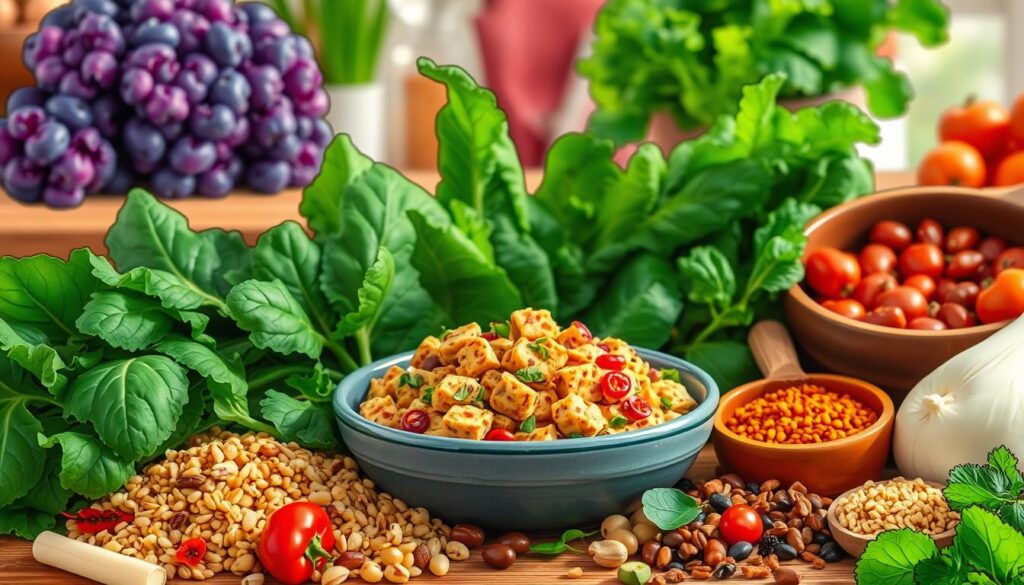Delicious plant-based meat options are revolutionizing the way we eat, offering a
Delicious plant-based meat options are revolutionizing the way we eat, offering a healthier and more eco-friendly approach to dining. Whether you’re just starting or already an experienced plant-based eater, these alternatives are a fantastic way to support both your health and the environment.
As the demand for delicious plant-based meat continues to rise, more and more people are choosing these nutritious, planet-friendly alternatives to traditional meat. Whether you’re a beginner or a seasoned plant-based eater, these tasty options help improve your health and reduce your environmental impact.
In this article, we’ll introduce you to 7 mouthwatering plant-based meat alternatives that are good for you and the planet. With the plant-based foods market expected to hit $162 billion by 2030, it’s clear that delicious plant-based meat alternatives are becoming a staple in many households.
Studies have shown that plant-based meats are not only healthier but also better for the environment. For instance, Beyond Meat’s meatless meatballs offer 19 grams of protein and bold flavors, while Gardein’s vegan chicken nuggets provide 10 grams of protein per serving.
Switching to delicious plant-based meat is simple, and with a bit of meal prep, it can save you time and money. Keep reading for budget-friendly, healthy recipes that will satisfy your cravings and support a greener planet!
Key Takeaways
- Plant-based diets can be delicious, eco-friendly, and sustainable.
- The plant-based foods market is expected to exceed $162 billion by 2030.
- Many plant-based meats offer high protein content; for example, Noble Plate’s crumbles contain 45 grams of protein per serving.
- Research indicates that plant-based meat is considered healthier and more sustainable compared to animal products.
- Meal prep and planning can help maximize your grocery budget while enjoying tasty meals.
- Delicious plant-based meat options like the Impossible Burger are designed to replicate the taste and texture of traditional meat, providing a familiar experience for meat lovers while being completely plant-based.
Introduction to Plant-Based Diets
Plant-based diets focus on eating whole, unprocessed foods from plants. They often cut out or reduce animal products. This shift is driven by environmental concerns and health issues linked to meat.
Many are moving away from high meat diets. This change boosts personal health and supports sustainable eating. The rise in plant-based meat alternatives (PBMAs) is notable, especially among those who sometimes eat less meat.
More people are trying to eat less animal protein. Many are adopting meat-free lifestyles. Exploring plant-based options can spark creativity in cooking and lead to healthier eating.
| Country | % of Population Adopting Plant-Based Diets | Growth Rate of Flexitarianism |
|---|---|---|
| United States | 10% of consumers avoid red meat | 5% decrease in meat sales (2015-2019) |
| United Kingdom | 21% consider themselves flexitarian | 25% increase in flexitarians in 2 years |
| Germany | 7% vegetarians (2018) | 6% annual increase |
| Italy | 94.4% increase in meat-free population (2011-2016) | Significant rise in plant-based choices |
| Spain | 1 in 8 declare being vegetarian or vegan | Positive growth trend for PBMAs |
Why Choose Plant-Based Meat Alternatives?
The popularity of delicious plant-based meat is growing rapidly. As more people seek healthier and ethical options, these alternatives are a great way to make the transition to a plant-based diet easier. Instead of consuming animal meat, many are opting for delicious plant-based meat to improve their health and reduce their environmental impact.
Delicious plant-based meat options are generally lower in saturated fats and cholesterol, making them an ideal choice for those looking to support heart health. Studies have shown that plant-based diets can lower heart disease risk factors, making delicious plant-based meat a powerful tool for healthy eating.
In addition, plant-based alternatives like delicious plant-based meat help in the fight against climate change. For example, the Beyond Burger creates 90% fewer greenhouse gas emissions compared to beef. This positive impact is part of what makes delicious plant-based meat a responsible and sustainable choice for all.
Health Benefits of Plant-Based Proteins
Delicious plant-based meats also offer a lot of protein and nutrients, helping us stay healthy. This is great for our overall well-being.
Lower in Saturated Fats
Plant-based proteins have less saturated fat than animal products. Eating less saturated fat can lower the risk of heart disease and type 2 diabetes. This makes delicious plant-based meat a good choice for a healthy diet.
High in Fiber and Nutrients
Plant-based diets are rich in fiber, thanks to foods like beans and whole grains. These foods help with digestion and weight management. They also provide important vitamins and minerals, boosting energy and supporting the body.
| Nutritional Component | Plant-Based Meats | Animal-Based Meats |
|---|---|---|
| Saturated Fat | Lower | Higher |
| Fiber | High | Low |
| Calories | Often lower | Higher |
| Nutrients like Iron and Niacin | Available | Available |
| Convenience | Varied | Standard |
Trying plant-based meats can be exciting and nutritious. When you ask if they are good for you, the answer is mostly yes. Looking at the nutritional differences helps us choose a healthier diet.
Exploring 7 Delicious Plant-Based Meat Alternatives for a Healthier, More Sustainable Diet
Looking for healthier eating options can lead to fun discoveries in the kitchen. Our top seven delicious plant-based meat alternatives are sure to impress. They offer unique flavors and textures, making it easy to add them to your favorite dishes.
Overview of Top Plant-Based Alternatives
- Tofu: A versatile classic that offers 14-19 grams of protein per serving.
- Tempeh: With a nutty flavor, it has 15-19 grams of protein per half-cup and is great for grilling or stir-frying.
- Seitan: Made from wheat gluten, it contains up to 25 grams of protein per 100 grams.
- Jackfruit: Perfect for shredded pork, it has a meaty texture that absorbs flavors well.
- Lentils: With 18 grams of protein per cooked cup, lentils are perfect for salads, soups, and veggie burgers.
- Beans and Legumes: High in protein and fiber, beans are great for hearty chili or satisfying tacos.
- Quinoa: With 8 grams of protein per cooked cup, quinoa is a nutritious base for many dishes.If you’re looking for healthier eating options, delicious plant-based meat is the way to go. These following alternatives offer unique flavors and textures, making them perfect options for enhancing your meals.
Popular Plant-Based Alternatives:

| Plant-Based Alternative | Protein (per serving) | Calories (per serving) | Cost (per serving) |
|---|---|---|---|
| Tofu | 14-19 grams | Varies by preparation | $2.00 |
| Tempeh | 15-19 grams | Varies by preparation | $2.50 |
| Seitan | Up to 25 grams | Varies by preparation | $3.00 |
| Jackfruit | 1 gram | 60 calories | $2.00 |
| Lentils | 18 grams | 230 calories | $1.00 |
| Beans | Varies (around 15 grams) | Varies | $0.80 |
| Quinoa | 8 grams | 222 calories | $1.50 |
Trying these delicious alternatives can make your meals exciting and healthier. Experiment with them in different cuisines to explore the endless possibilities of plant-based meals!
Tofu: The Versatile Classic
Tofu is a key ingredient in many dishes, loved for its flexibility and health perks. It’s made from soybeans and is packed with protein. This makes it a favorite among those trying plant-based meats. Learning about tofu’s benefits can lead to healthier eating and a greener future.
Different Types of Tofu
Tofu comes in many types, each suited for different recipes:
- Silken tofu: Ideal for smoothies and desserts.
- Soft tofu: Perfect for soups and dips.
- Medium-firm tofu: Great for stir-fries and scrambles.
- Firm tofu: Ideal for grilling and roasting.
- Extra-firm tofu: Best for stir-frying and baking.
- Super-firm tofu: Works wonderfully in recipes needing a firmer texture.
How to Incorporate Tofu into Your Diet
Adding tofu to your meals can be fun and rewarding. Here are some tips to enjoy this plant-based meat:
- Try marinating tofu before cooking to boost its taste.
- Blend silken tofu with fruits for a creamy smoothie.
- Add firm tofu to stir-fries with colorful veggies for a healthy meal.
- Grill extra-firm tofu on skewers for a tasty barbecue dish.
- Use tofu in curries or stews to thicken and flavor the dish.
Tofu is low in calories and very versatile. It not only adds to our cooking but also makes us think about the healthiness of plant-based meats. Embracing tofu can lead to tasty meals and a deeper look into sustainable food choices.
Tempeh: Fermented Goodness
Tempeh is a standout in plant-based diets, offering taste and nutrition. It’s a fermented soybean product from Indonesia. It has a nutty flavor and firm texture, making it satisfying.
The fermentation process improves its taste and nutrition. It’s packed with protein, fiber, and probiotics. These tempeh benefits make it a favorite among health enthusiasts.
The Nutritional Profile of Tempeh
Tempeh is rich in nutrients, making it a great addition to meals. Here’s what you get from 100g of tempeh:
| Nutrient | Amount per 100g |
|---|---|
| Calories | 166 Kcal |
| Protein | 20.7 g |
| Fat | 6.4 g |
| Carbohydrates | 6.4 g |
| Fiber | 5.7 g |
| Iron | 3.6 mg |
| Calcium | 120 mg |
| Magnesium | 70 mg |
| Phosphorus | 200 mg |
Tempeh’s fermentation boosts its nutritional value. It’s rich in prebiotic fiber, supporting gut health. It’s a great meat substitute, offering a unique flavor.
Many think are plant-based meats unhealthy, but tempeh is not. It can lower LDL cholesterol and improve bone health, especially for post-menopausal women. Its protein content makes it a versatile choice.

Seitan: The Wheat Protein Powerhouse
Seitan, also known as wheat meat, is a standout among alternative meats. It’s made from vital wheat gluten and has a chewy texture. It packs 25-20 grams of protein per 100 grams, making it a top choice for plant-based protein.
It has just 2 grams of carbs and 2 grams of fat. This makes it great for those on low-carb diets.
Seitan is packed with benefits. It has 150 calories per serving and is rich in nutrients like calcium and iron. These are key for strong bones and carrying oxygen in the body.
It also has magnesium and phosphorus, which help with metabolism. This boosts the nutritional value of any dish with seitan.
Storing seitan is easy; keep it in an airtight container in the fridge for a week or freeze it. Its ability to soak up flavors makes it a favorite in many kitchens. You can try different marinades and spices to make your meals more exciting.
Here’s a comparison of seitan with tofu, another popular plant-based protein:
| Protein Source | Protein (g) | Carbohydrates (g) | Fat (g) | Calories |
|---|---|---|---|---|
| Seitan | 25-20 | 2 | 2 | 150 |
| Tofu | 10-15 | 2 | 5 | 130 |
Adding seitan to your meals can help your heart and aid in weight control. It makes you feel full, which can lower hunger hormones. People who eat plant-based proteins like seitan tend to have less body fat and a healthier BMI.
Seitan is versatile and can easily fit into a plant-based diet. It adds flavor and satisfaction to your meals without compromising taste.
Jackfruit: The Tropical Wonder
Jackfruit is a fascinating ingredient that has gained popularity. It has a unique texture that makes it a great substitute for meat. It can even mimic pulled pork, making it a versatile vegan meat alternative. Let’s explore how to prepare jackfruit to bring out its delightful qualities in our meals!
How to Prepare Jackfruit
Choosing the right jackfruit is crucial for the best results. Look for firm, young green jackfruit. It has a neutral flavor that absorbs marinades well. Here’s a simple jackfruit recipe for delicious Carnitas Tacos that serves four people:
- Ingredients:
- 2 cans of jackfruit (20 oz each)
- 1 medium yellow onion
- 6 cloves of garlic
- 1 canned chipotle pepper
- 1 lime
- 1 teaspoon of cumin powder
- 1 teaspoon of smoked paprika
- 2 tablespoons of olive oil
- 8 corn tortillas
- Cooking Time: Approximately 40 minutes
Begin by draining and rinsing the jackfruit. Sauté chopped onions and minced garlic in olive oil until golden. Add the jackfruit, chipotle pepper, lime juice, cumin, and smoked paprika to the pan. Cook for about 25 minutes, shredding the jackfruit with a fork as it softens for a meat-like texture.
| Ingredient | Measurement |
|---|---|
| Jackfruit | 40 oz (2 cans) |
| Onion | 1 medium |
| Garlic | 6 cloves |
| Canned chipotle pepper | 1 |
| Lime | 1 |
| Cumin powder | 1 teaspoon |
| Smoked paprika | 1 teaspoon |
| Olive oil | 2 tablespoons |
| Corn tortillas | 8 |
These Carnitas Tacos are a heart of plant-based cuisine. They bring together traditional flavors with innovative ingredients. Try different toppings and sides to make your tacos unique.
This shows the endless possibilities of vegan meat alternatives while enjoying a healthy and sustainable meal. For more information and recipes, check out this in-depth article on plant-based meat alternatives.
Beans and Legumes: Nutrient Powerhouses
Beans and legumes are top picks for plant-based protein sources. They’re full of nutrients and are easy on the wallet. Adding them to your meals can boost your protein, improve digestion, and give you lots of vitamins and minerals. You can find a bean for every dish, from stews to salads and even burgers!
Types of Beans and Their Benefits
There are many types of beans, each with its own health perks. Here’s a quick look at some popular ones:
| Type of Bean | Protein (per ½ cup) | Key Nutrients | Main Benefits |
|---|---|---|---|
| Black Beans | 7.5 grams | Fiber, Iron, Antioxidants | Good for heart health and digestion |
| Chickpeas | 7.5 grams | Fiber, Folate, Manganese | Promotes fullness and aids weight management |
| Lentils | 9 grams | Iron, Folate, Magnesium | Supports cardiovascular health and digestion |
| Kidney Beans | 7.5 grams | Fiber, Potassium, Manganese | Boosts digestive health and blood sugar control |
| Pinto Beans | 7.5 grams | Fiber, Iron, Phosphorus | Enhances energy levels and supports bone health |
Adding beans to your meals is not just good for you, it’s also fun. Try making a Moroccan tagine with chickpeas or a simple lentil soup. It makes going meatless easy and tasty.
Eco-Friendly Meat Alternatives and Their Sustainability Impact
By choosing delicious plant-based meat options, you not only make a healthier choice for yourself but also help reduce greenhouse gas emissions and water usage, making a significant positive impact on the planet.
Plant-based patties are much better for the planet than beef. They use less land, water, and cause less pollution. Even small changes, like eating 5% less meat, can help a lot.
The market for plant proteins is growing fast, expected to hit $162 billion by 2030. Soy, wheat, and pea are already popular. New proteins from corn, rice, and chickpeas will soon follow. Fungal and canola sources are coming, and algae and cellular options are on the horizon.
Food production is a big source of greenhouse gas emissions, making up 21–37% of global emissions. It also uses a lot of water, about 70% of the world’s freshwater. This shows how big of a footprint agriculture has on our planet.

More people are choosing plant-based options for the planet. Groups like the Plant-Based Food Alliance help with labeling. This makes it easier for us to make good choices. With so many facing hunger and malnutrition, these alternatives are key to solving health and environmental issues.
| Factor | Traditional Meat | Plant-Based Alternatives |
|---|---|---|
| Climate Change Burden | Higher emissions | 77% smaller impact |
| Water Usage | 70% of global freshwater | Significantly less |
| Food Insecurity | Contributes to food shortages | May alleviate shortages |
| Market Value (by 2030) | N/A | $162 billion |
Exploring eco-friendly meat alternatives shows their potential. They can make our planet healthier and improve our well-being through sustainable eating choices.
Conclusion
Exploring healthy plant-based swaps is an exciting journey. Choosing delicious plant-based meat not only enhances your meals but also contributes to a healthier planet. With the plant-based meat market projected to reach $162 billion by 2030, it’s clear that delicious plant-based meat has come to stay.
Opting for plant-based alternatives like delicious plant-based meat is a great way to enjoy tasty, healthy meals while reducing your carbon footprint and supporting sustainability. Try these options at home and enjoy a healthier, more responsible future!

